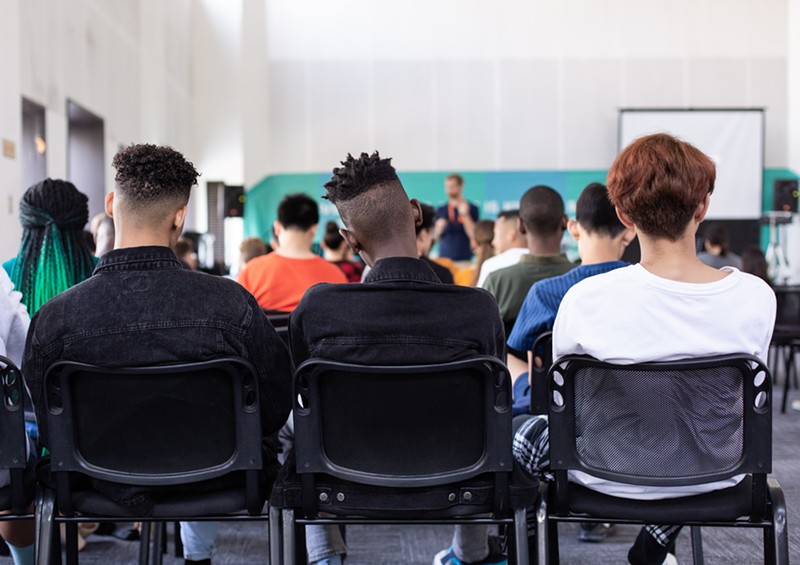In April, Dallas ISD announced it was aiming to eliminate suspensions starting in the fall. Kids who commit serious infractions will still be referred to a disciplinary alternative education program.
District teacher and organizer Satoria Ray said she supports the ban as suspensions perpetuate racial disparities and can have long-lasting consequences. Plus, it’s personal for her. As a woman of color, she wants to see her Black students succeed in the classroom.
“[Suspension] starts this cycle of students misbehaving, being pushed out of the school, therefore becoming disengaged with education altogether — and the relationship that they have with education going downhill very quickly,” she said.
Critics fear that without suspensions, students will essentially get let off the hook for bad behavior. Yet many education experts and teachers say the disciplinary measure does far more harm than good.
During the 2019-2020 school year, around 52% of Dallas ISD's out-of-school suspensions were comprised of Black students, despite the fact they only made up 21.6% of the district’s total enrollment, according to The Dallas Morning News.
Both in-school and out-of-school suspensions would be virtually eliminated if trustees approve a proposal on Thursday, making Dallas ISD one of the country's first major districts to do so. Only extreme examples of misbehavior would result in expulsion or removal from school.
Instead, students would be sent to a so-called "Reset Center" to temporarily separate them from their peers. There, they'd continue working on assignments while also focusing on behavioral problems.
Ray has worked as a DISD teacher for two years, and many of her eighth-grade students reported they’d been suspended at least once since first beginning school. Each time they’re dealt an out-of-school punishment, kids get further and further behind in their coursework, she said.
Research shows just one suspension increases the likelihood that a student will come in contact with the criminal justice system, she said. Repeated suspensions could also push a student to drop out, which in turn may lead them to brushes with the law."I’m so glad that Dallas ISD is willing to stand up,” – Aicha Davis, educator
tweet this
Schools often work as “funnels into the incarceration system,” and some could wind up in jail, juvenile detention or immigrant detention centers, Ray said. The likelihood a kid will face illiteracy, homelessness and poverty also increases.
Yet the issue of Black students being disproportionately punished isn’t unique to Dallas ISD, Ray said. Rather, it’s part of a broader nationwide racism problem.
“One of the biggest reasons is this underlying bias that teachers hold, an anti-Blackness that exists among a lot of people,” she said. “When a Black student misbehaves, they might not be the only student misbehaving. But if you already have a bias towards Black students or Black people, we see that playing out in the classroom.”
Back when he was a state representative, Dallas Mayor Eric Johnson spearheaded legislation that eliminated suspensions for kids in the second grade or younger. Dallas has been “fighting the good fight” for a few years, and the broader suspension ban is a continuation of that effort, said Aicha Davis, a member of the Texas State Board of Education.
In-school suspensions can frustrate learning, too, said Davis, who is also a doctoral student in education leadership and policy at the University of North Texas. Kids are often handed a worksheet and don’t receive authentic engagement. They also miss out on chances to participate in labs or other in-class activities, which prepare them for future lesson plans.
Davis believes education officials should implement restorative practices, which are research-based and proven. Then, teachers and counselors can get to the root of the problem so the student can fix their behavior on their own.
She said that’s better than sending a kid back home, which in some cases may not be a safe environment in the first place.
“You have some kids who are behaving in a way because they’re going through some kind of trauma at home,” Davis said. “And now we’re sending them right back home to be in that situation even longer, now throughout the entire day, throughout the entire evening without even really trying to figure out what’s going on.”
Many educators condemned the Texas Legislature this past session for passing a law that will make it more difficult to teach about racism. And Davis is disappointed that the so-called “CROWN Act” stalled out, which would have prohibited discrimination in schools on the basis of one’s natural hair.
Texas resident DeAndre Arnold testified in support of the bill, Davis said. As a high school senior last year, he’d been suspended and told he couldn’t walk at graduation because of his long dreadlocks.
The district’s suspension ban will ultimately protect Black students from similar discrimination, Davis said.
“That’s why I’m so glad that Dallas ISD is willing to stand up,” she said. “And I believe that it’s going to be a trend that I hope other districts will follow to protect all of the students around Texas.”












